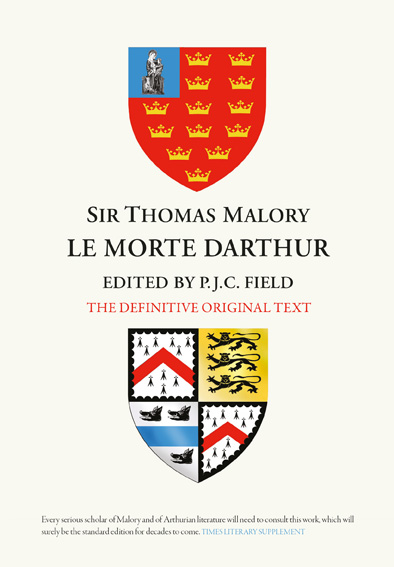Book contents
- Frontmatter
- Contents
- Introduction
- King Uther and King Arthur
- King Arthur and the Emperor Lucius
- Sir Launcelot Du Lake
- Sir Gareth of Orkney
- Sir Tristram De Lyones: The First Book
- Sir Tristram De Lyones: The Second Book
- The Sankgreal
- Sir Launcelot and Queen Guenivere
- The Morte Arthur
- Index of Names
- Glossary
Introduction
Published online by Cambridge University Press: 11 January 2024
- Frontmatter
- Contents
- Introduction
- King Uther and King Arthur
- King Arthur and the Emperor Lucius
- Sir Launcelot Du Lake
- Sir Gareth of Orkney
- Sir Tristram De Lyones: The First Book
- Sir Tristram De Lyones: The Second Book
- The Sankgreal
- Sir Launcelot and Queen Guenivere
- The Morte Arthur
- Index of Names
- Glossary
Summary
THE AUTHOR
The records of English authors before the seventeenth century rarely shed much light on their writings. The documents that tell us about Chaucer's abilities as a civil servant and Shakespeare's as a businessman make only fleeting and ambiguous connections with the books they wrote. The dichotomy is even more marked in Malory's case. One document records accusations of violent crimes that many readers have felt were incompatible with the ideals of chivalry that they saw embodied in Le Morte Darthur. Other Thomas Malorys were suggested as author, but the book itself ruled them out. Its closing words reveal that its author was called Thomas Malory and that he was a knight at some time in the ninth year of King Edward IV of England, which ran from 4 March 1469 to 3 March 1470. Sir Thomas Malory of Newbold Revel in Warwickshire, the man accused of the crimes, was demonstrably the only knight with that name alive then. Readers had to deal with the anomaly as best they could, perhaps by deciding that the accusations were false or the crimes justifiable, or that the book was not as idealistic as earlier generations had taken it to be, or that the man changed in the twenty years between the crimes and the writing of the book, or that he had seen the good and recognised it, but pursued the bad notwithstanding.
The man who caused this anxiety was born about 1416 into an extended family that had had lands in the English counties of Warwickshire, Leicestershire, and Northamptonshire for centuries. Occasionally some mixture of accident and ability raised one of them to national prominence. One became briefly joint leader of the party of the sons of King Henry II in their war against their father, another the judge who managed the state trial of the Scottish patriot William Wallace so he was convicted of treason, and a third prior of the Knights Hospitallers of St John of Jerusalem in England, which made him a professional crusader with a seat in the House of Lords. The overwhelming majority, however, lived ordinary lives in the middle rank of society. The modern phrase “middle class” would be very misleading, but their lives were defined by their being the indispensable middle component of the social hierarchy.
- Type
- Chapter
- Information
- Sir Thomas Malory: Le Morte DarthurThe Definitive Original Text Edition, pp. vii - xxxivPublisher: Boydell & BrewerPrint publication year: 2017

